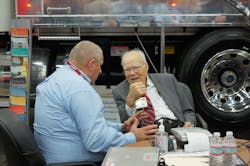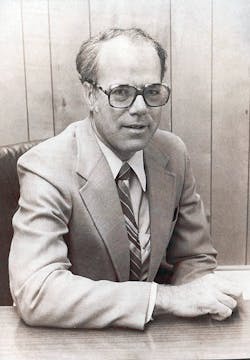God, family, country, Corps, TBB
Paul Schenck, who grew up on family farm in Iowa then traveled the world—first as a U.S. Marine and later as a journalist—before settling down on his farm in Texas, died peacefully at home March 30 2022 surrounded by family. He is survived by his wife of 60 years and longtime business partner, Wanda "Tod" Tunnell.
Schenck was the founding editor of Trailer/Body Builders magazine, part of a publishing group built by Wanda’s father, Charles N. Tunnell. Paul ran the magazine for 40 years, and he and Wanda, who sold ads, often traveled as team—making friends and creating memories that are still recalled at trailer conventions and manufacturing facilities today.
He also launched TBB’s highly regarded Trailer Output Report in 1994, only reluctantly handing over his duties just two years ago.
A writer and mentor
Bruce Sauer went to work for TBB in 1974.
“I was a kid just a couple years out of college when Paul hired me as his associate editor,” Sauer said. “The job title made me sound important. When I asked Wanda what my job description would be, she simply replied ‘to help Paul.’ But helping Paul opened the world to me.
“Paul helped me understand the challenges our readers face each day and the creativity required to make their companies successful,” Sauer said. “Most importantly to me, I got to be personal friends with many of them. People were also important to Paul.”
Schenck had “plenty on his plate” when he brought Sauer on. He was a one-man editorial staff at a time when Trailer/Body Builders was really beginning to grow, Sauer noted. Schenck also was the editorial director of a second magazine, Refrigerated Transporter, and served as president of the company.
Despite the demands on his time, Schenck never took shortcuts, Sauer explained. He insisted on reading every word that his editors wrote and held the editorial staff to his “exacting” expectations for the publications.
“Paul had an uncanny ability to sniff out typos and to identify sentences that did not measure up to his clarity standards,” Sauer said. “He also questioned our accuracy. We recognized that Paul could be wrong sometimes and that we could be right—but we also recognized that the odds of Paul being wrong were not in our favor.”
Sauer pointed out that his career at TBB began just as Nixon’s Watergate scandal was transforming journalism.
“But Paul’s principles never wavered. Is it true? Is it accurate? Is it fair? And is it helpful?” Sauer said. “Paul didn’t like fluff, but he valued our responsibility to deliver magazines that benefited the people who read them.
“And I was one of the people who benefited from him the most.”
Likewise, before John Conley was president of the National Tank Truck Carriers for nearly 25 years, he spent 10 years working for Paul.
“Paul was a mentor and a friend,” Conley said. “I joined Paul and Tod when Tunnell Publications bought Modern Bulk Transporter in 1979. He allowed me to continue to work as editor from the Washington D.C. area until I left to join NTTC in 1989.”
Under Paul's leadership, the quality and size of the magazine, now published as Bulk Transporter, grew—“as did its influence in the industry,” Conley noted.
And, echoing Sauer’s recollection, Schenck was “first and foremost” a writer.
“He appreciated ‘tight’ writing and he challenged his editorial staff to ‘get to the point,’” Conley said. “Paul taught me photography, since we took our own pictures for our articles. I still think of his advice for magazine covers with every picture I take: ‘Shoot vertical, fill the frame, show people doing something.’”
Conley noted that he was “lucky” to keep in touch with Paul until he died.
“In everything Paul did, he remained true to his U.S. Marine Corps Semper Fi,” said the fellow Marine. “I will miss him, but all of my memories are happy."
In April 1988, TBB featured “a big spread” profiling the truck body manufacturing company that would grow to become The Godwin Group. Founder Pat Godwin proudly recalled Schenck’s telling him that company had the best laid-out facility he had ever seen—"and he had seen a lot.”
“He put me on the front cover standing in front of a crane I designed,” said Godwin, who could be found wandering the floor at The Work Truck show last month. “Paul and Wanda were always good to me and they really promoted me when me and my business were getting started. Wanda was always by his side and she respected me in my industry and the feeling was mutual.
“At every trade show, she’d look me up to see if I was there. She’d go to my booth and pull me aside to talk to me, she was inquisitive of what was going on, and asked about the next project.”
Godwin added that every time they ran into each other, Schenck brought up his animals.
“He was a farm boy at heart,” Godwin said. “I will miss Paul. He and Wanda worked very hard at promoting their trade journal. They were just very nice people.”
His life
Paul Edgar Schenck was born 1929 in Algona, Iowa, and grew up on the family farm homesteaded by his great-grandfather in 1856. He and his three brothers all attended the one-room rural school adjacent to the farm. He graduated from Algona High School in 1946 and then received a bachelor's degree in English from Iowa State Teachers College, now the University of Northern Iowa, in Cedar Falls, in January 1950.
Paul was drafted into the United States Marine Corps during the Korean Conflict. He served almost three years, first in the enlisted ranks and then as a commissioned officer—the last year in Yokosuka, Japan. The Marine Corps provided pivotal experiences, discipline and leadership for Paul that endured his lifetime.
Upon discharge from the service, he moved to Houston, Texas, and began work as a writer and photographer for Tunnell Publications Inc. There he met and married Wanda "Tod" Tunnell.
Schenck retired in 1998 after 40 years managing the company’s magazines, yet continued as a consultant and field editor, focusing on the international arena. He relished covering truck and intermodal events throughout North America, Europe, the Orient and Australia.
Schenck began restoring old Texas pioneer buildings in 1971, moving several to the family’s large farm near La Grange, Texas to be reconstructed. A typical German four-room house that had started as a one-room cedar log cabin in the 1840s was restored on its original site on the farm. The largest project was moving the 1847 Willrich family home to the Schenck portion of “the bluff” nearby and rebuilding the fachwerk structure to become the Schenck family home. Oak beams salvaged from the 1865 Trinity Lutheran Church at Black Jack Springs were used in the construction. The most recent project was rebuilding of an 1859 oak log house moved to Texas from his cousin's farm in Liscomb, Iowa.
Schenck's love for classical music and opera was sparked by his mother's influence on the farm. He and Tod supported Festival Hill music projects since the 1970s and enthusiastically attended concerts each year. Singing was a double form of prayer for Schenck. He joined the Texas German Society and sang with their choral group, where he was the only non-native German singer. He truly enjoyed learning more about the German language and inflections from these friends.
The richness of Paul's life revolved around history—the history of the world, the U.S., military and family. Farm life, lifelong learning, stories of people, places and operations, classical music, his church and his family all blended for him. He was a member of Houston’s Christ the King Evangelical Lutheran Church for 60 years.
Half-brother Sandy Schenck farms the old homestead north of Algona as the fourth generation, and Paul was quite pleased with the ongoing operation of his family’s heritage.
At Algona High School, Paul memorized the Coleridge poem, “The Ancient Mariner,” from which he recited over the years. His favorite stanza were lines 614-617:
He prayeth best who loveth best
All things both great and small;
For the dear God loveth us,
He made and loveth all.
Wanda, or Tod to many, kept a corner office at the magazines’ Houston headquarters until the COVID-19 lockdown. One of Schenck’s sons, Ray Anderson, was publisher of the family’s magazines for many years before retiring recently. Schenck is also survived by children Kathleen Schenck Glassford (David), Gregory Schenck (Karen), and Robin Anderson Stait (Geoffrey), along with many grandchildren and great-grandchildren.
For an honorary remembrance, the family asks for consideration of the Colorado Valley Detachment for the Marine Corps League. Schenck was actively involved with this League, serving in several capacities for many years. Donations may be mailed to Larry Schimek at 500 Veteran Memorial Drive, LaGrange TX 78945.
Old friends may reach Ray or Wanda at [email protected].

